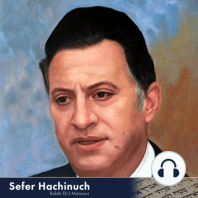20 min listen
Misva #142: The Prohibition Against Leaving Over the Korban Toda
FromSefer Hachinuch
ratings:
Length:
20 minutes
Released:
Feb 17, 2022
Format:
Podcast episode
Description
The Torah in Parashat Sav (Vayikra 7:15) establishes that when one brings a Korban Toda (thanksgiving offering), he may eat the sacrifice the day he brings it, and the following night, but he may not leave over any of the sacrifice until morning. The Sages understood that this command applies to all sacrifices which are eaten – it is forbidden to leave over the meat beyond the final time prescribed for eating it. The Torah stipulates that if one violated this prohibition and left over sacrificial meat beyond the prescribed time, then he must burn the leftover meat. The prohibition of “Notar” (leftover sacrificial meat) thus falls under the category of “Lav Ha’nitak La’aseh” – a prohibition which, if violated, requires one to do something which in a sense rectifies the violation. Such prohibitions are exceptional in that those who violate these commands do not receive Malkut. The Korban Toda belongs to the Shelamim category of sacrifices, but it differs from other Shelamim in that the Torah prescribed a shorter time-frame for its consumption. Other Shelamim sacrifices may be eaten for “two days and one night” – meaning, the day the sacrifice is offered, that night, and the following day, until sundown. If, for example, a standard Shelamim sacrifice is offered on a Monday afternoon, its meat may be eaten until sundown on Tuesday. The Korban Toda, however, as mentioned earlier, may be eaten only through the next night. If a Toda was offered on Monday, then it may be eaten only until dawn Tuesday morning. Ironically, the Torah prescribed a shorter time-frame for the Korban Toda despite the fact that there is more to eat when a Korban Toda is offered than when other Shelamim sacrifices are offered. A Korban Toda, unlike other Shelamim offerings, consists of not only an animal, but also forty loaves of bread. The question thus arises as to why the Torah would require eating the largest Shelamim sacrifice – the Korban Toda – within a shorter time-frame than that prescribed for other Shelamim sacrifices? A famous answer to this question is offered by Abarbanel (1437-1508), in his Torah commentary. He writes that the purpose of the Korban Toda is, of course, to express gratitude and thanksgiving to G-d. Specifically, the Toda offering would be brought after one emerged safely from one of four dangerous situations – illness, captivity, a sea voyage, or desert travel. These are described in the 107 th chapter of Tehillim, which says that people who emerge from these situations shall praise G-d for His kindness (“Yodu L’Hashem Hasdo”), and shall exult Him publicly (“Vi’yromemuhu Bi’khal Am”). When a Toda offering is brought, it is done for the purpose of publicly praising G-d for His graciousness. For this reason, Abarbanel explains, the Torah required one who brings a Toda to include a large amount of food which must be eaten within a short period of time – to ensure that he will invite guests with whom to share his feast, and to whom he will speak of how G-d assisted him and extricated him from danger. The extra food required with this sacrifice, and the shorter time-frame allowed for its consumption, have the effect of enhancing the public nature of the sacrificial feast, as a large gathering will be invited to participate, thus bringing glory to G-d. On this basis, we can perhaps explain the comments of Rabbenu Bahya (Spain, 1255-1340), in his Torah commentary to Parashat Sav (6:2). He notes the famous verse in the Book of Yirmiyahu (33:11) foreseeing the time when “the sound of rejoicing, the sound of happiness, the sound of a groom and the sound of a bride” will again be heard in Jerusalem. The verse continues, “…the sound of people saying: ‘Give thanks to the G-d of Hosts, for G-d is good, for His kindness is eternal,’ as they bring a thanksgiving offering in the House of G-d…” The implication of this verse, Rabbenu Bahya writes, is that in the times of the Bet Ha’mikdash, a bride and groom would offer a Korban Toda, and this was t
Released:
Feb 17, 2022
Format:
Podcast episode
Titles in the series (100)
Misva #8: Leaving Over Meat of the Korban Pesach: Daily Sefer Hachinuch - Brought to you by itorah.com by Sefer Hachinuch
